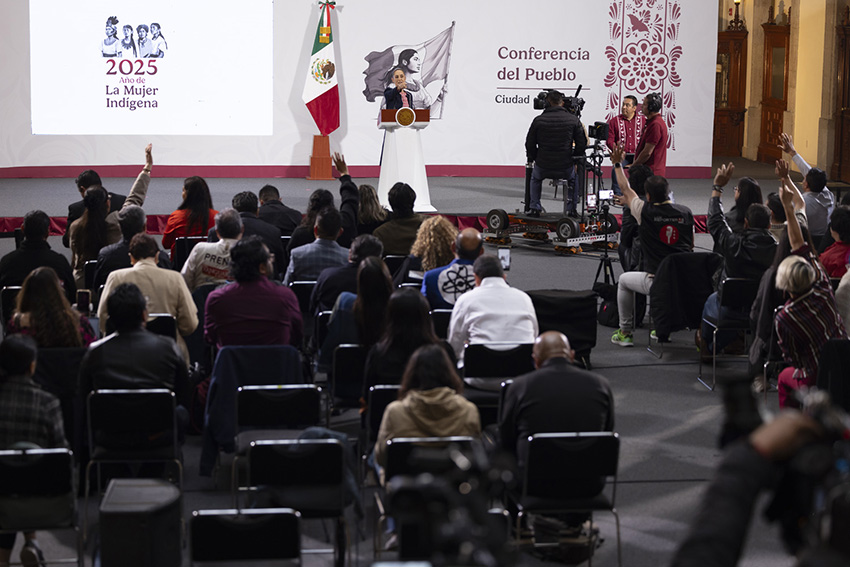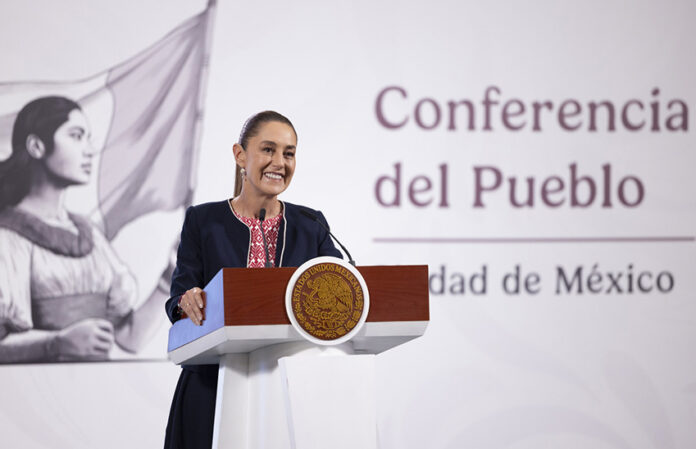The upcoming visit to Mexico of United States Secretary of State Marco Rubio was a key focus of President Claudia Sheinbaum’s Friday morning press conference.
It will be Rubio’s first trip to Mexico since he became the United States’ top diplomat.
Sheinbaum was asked about the agenda for her meeting with the 54-year-old Trump administration official as well as the new bilateral security agreement (or “understanding”) that Mexico and the United States have been negotiating in recent months.
As usual, the president’s mañanera was held at the National Palace, where the meeting with Rubio will take place next week.
Sheinbaum will meet with Marco Rubio in CDMX on Sept. 3
Sheinbaum told reporters that Rubio is coming to Mexico next Wednesday Sept. 3.
“He’ll be here and we’re going to have a meeting with him,” she said four days after she told the press corps that it was likely Rubio would come to Mexico next week to sign a new bilateral security agreement.

Sheinbaum said on Friday that the agreement — or “understanding” as she is now calling it on the advice of the Ministry of Foreign Affairs — wouldn’t necessarily be signed during the secretary of state’s visit.
The U.S. Department of State announced on Thursday that Rubio would travel to Mexico and Ecuador between Sept. 2 and 4 “to advance key U.S. priorities.”
A statement from a Department of State spokesperson said those priorities include “swift and decisive action to dismantle cartels, halt fentanyl trafficking, end illegal immigration, reduce the trade deficit, and promote economic prosperity and counter malign extra continental actors.”
“The Secretary’s fourth trip to our hemisphere demonstrates the United States’ unwavering commitment to protect its borders, neutralize narco-terrorist threats to our homeland, and ensure a level playing field for American businesses,” the statement said.
“Secretary Rubio’s engagements will deepen bilateral ties with Mexico and Ecuador and foster broader burden sharing across our region,” it concluded.
Asked about the agenda for her meeting with the Miami-born former senator, Sheinbaum said that the secretary of state is coming to Mexico to conclude talks related to the new security “understanding.”
“And we’re going to take the opportunity to show him everything we’re doing in Mexico in many areas, and in particular on the issue of security,” she said.
Sheinbaum said that the new security pact “wouldn’t necessarily be signed” next week because “everything that has to do with bilateral relations has its protocols.”
She said that there is nothing “very new” in the “understanding,” apart from “some things that have to do with joint investigations into fentanyl precursors.”

“How do fentanyl precursors arrive? For example,” Sheinbaum said.
She also said there are “some other [new] frameworks for collaboration and coordination, within the framework of respect for our sovereignty.”
Sheinbaum indicated that the new Mexico-U.S. security “understanding” acknowledges the importance of campaigns to prevent drug use, and notes that the U.S. government has to work to “avoid the trafficking of weapons” to Mexico.
The president previously revealed that the bilateral pact is “fundamentally” based on “sovereignty, mutual trust, territorial respect … and coordination without subordination.”
The Mexico-U.S. security relationship is currently governed by the Bicentennial Framework for Security, Public Health and Safe Communities. That agreement took effect in late 2021, superseding the Mérida Initiative.
Agreement? Understanding? ‘It’s the same thing,’ says Sheinbaum
A reporter asked the president what the difference is between a security agreement and a security understanding.
“It’s the same thing,” Sheinbaum responded.
“The Ministry of Foreign Affairs made the clarification,” she said, explaining that there are a variety of “categories” of bilateral pacts, each with a different name.
“Some even need approval from the [respective] senates, like the USMCA, for example,” Sheinbaum said.

She reiterated that the new security “understanding” with the United States is “the same thing” as the agreement she has recently been speaking about.
“The Foreign Affairs Ministry just clarified what its name is,” Sheinbaum said.
“Let’s see if you can ask the foreign affairs minister for the exact name of this agreement, this understanding that we’ve been negotiating for several months,” she said.
Asked what is the difference between the new, soon-to-be signed “understanding” and the Bicentennial Framework that took effect in 2021, Sheinbaum said the former is “very similar” to the latter.
“They are high-level agreements for security issues and other issues,” she said.
‘They proposed greater intervention in our country and we said no’
Sheinbaum said that the United States asked for things “that weren’t acceptable for us” during the negotiations for the new security understanding.
She said that her government also proposed things that the United States thought “shouldn’t be in this document.”
Pushed as to what U.S. proposals were unacceptable for Mexico, Sheinbaum said:
“They proposed greater intervention in our country and we said no.”
US drone that flew over cartel stronghold came at Mexico’s request, security minister says
Sheinbaum revealed in May that she had rejected an offer from U.S. President Donald Trump to send the U.S. Army into Mexico to combat drug cartels. She has repeatedly said that her government will never accept any kind of foreign intervention in Mexico, although it has allowed the U.S. to fly drones over the country to spy on drug cartels, including in a mission earlier this month.
On Friday, Sheinbaum said that her government will “never sign anything that, from our perspective, violates our sovereignty or our territory.”
“They can have the intention to do it, but we told them no,” she said.
“It’s the same as in the calls I’ve had with President Trump, where he says: ‘Don’t you want us to help you with the U.S. army?’ And I tell him, ‘No President Trump, that are many other forms of collaboration and cooperation, but not that.”
By Mexico News Daily chief staff writer Peter Davies (peter.davies@mexiconewsdaily.com)
